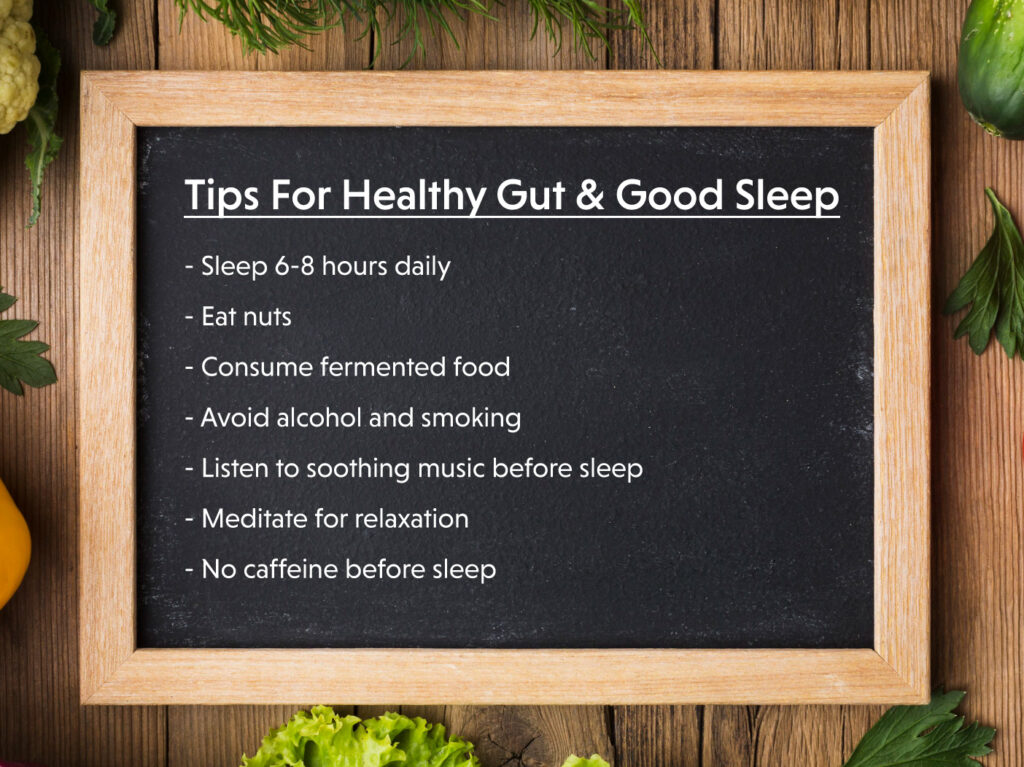Sleep and Gut Health- How is it Connected?
Do you feel disconnected from the outer world while you sleep? Is there a deep relaxation that dissociates you from ongoing activities of the day and you sleep like a baby?
Did you know sleeping for a stipulated time is essential for holistic functioning? Read this blog to learn the benefits of sleep on the gut microbiome.
How does sleep affect gut health?
Sleep is essential for relaxation. Following a routine for work and sleep is necessary for your organs to function efficiently. It is also important to detox tissues and organs. When you are asleep, you are free from your worries.
A gut microbiome refers to a set of microbes in the gut. When your gut is healthy, you get enough sleep, and if the gut microbiome is disturbed, it may lead to gastrointestinal disorders that do not let you sleep.
Sleep deprivation changes your microbiome composition. It increases the risk of bad gut bacteria overriding the good bacteria. Lack of sleep affects gut health by causing symptoms such as bloating, gas, and diarrhea. Sleep disturbances cause hormonal imbalance and stress. In turn, regular stress can lead to several digestive disorders.
Sleep affects cognitive functions.
Gut health impacts the brain, as messages are relayed between the gut and the brain through the vagus nerve and many chemicals known as neurotransmitters.
Gut Health through good gut bacteria plays a vital role in memory, maintenance of circadian rhythm, and good mental health. Circadian rhythm is a 24-hour rhythmic pattern of behavioral, physiological, and psychological changes. Good microbes synthesize chemicals that function as mediators between the microbes and the circadian rhythm.
Good sleep improves gut health

6-8 hours of daily sleep restores chemicals such as serotonin and dopamine, which are essential for a healthy gut function. If you sleep well, your body relaxes, increasing the convenience of internal organs rejuvenating themselves. Lack of sleep may cause chronic fatigue, mental fog, and insomnia.
With the onset of digital trends, it becomes difficult to sleep as you are prone to using social media and other online platforms. These interrupt sleep, altering the microbial composition of your gut. The radiation from these gadgets also affects your physiological functions that affect sleep.
A good gut microbiome improves digestion, sleep, and immune system activities. Taking medicines for improving sleep has adverse effects on gut health.
Role of the gut microbiome in cellular signals
The gut microbiome communicates to the brain, which affects mood and appetite. Bifidobacteria (a type of bacteria) in the gut facilitate sleep in children enabling them to rest properly. Research has proven that some good gut bacteria can protect from gastrointestinal cancers.
How does stress affect gut health?
The vagus nerve interconnects the gut and brain improving the quality of sleep. Suppose you are stressed either at work or elsewhere. Blood sugar levels tend to fall, increasing your appetite and making you crave sugary foods. Regular stress can cause a “fight or flight response” through the adrenalin rush and is unhealthy.
Sleep deprivation makes you tired and hungry all the time. You tend to eat unhealthy food risking your gut health. Regular carbohydrate consumption also increases trans-fat deposition affecting health. The fat deposition in excess leads to health issues such as diabetes and obesity.

Lack of sleep causes stomach problems.
Melatonin is known as the sleep hormone. The presence of light affects the production of this hormone. Melatonin also regulates the movement of food in the intestine. Thus, any imbalance in the production of this hormone can affect sleep and gut health.
When you experience a lack of sleep, you are prone to stomach disorders that disturb digestion and absorption of food.
How to improve gut microbiome?
Consume fermented foods such as yogurt and Kimchi to increase good gut bacteria for gut health. Also, include more plant-based foods in your diet.
Factors affecting microbial composition in the gut
Environment, physical and physiological conditions affect the gut microbiome. The immune system and gut microbiome connection restore health. The immune system gets suppressed by dysbiosis(bad gut bacteria overriding good gut bacteria), affecting metabolism and cognition.
The imbalance in the gut microbiome leads to the release of toxins into tissues, causing inflammation and other diseases.
Effect of Diet
- One can improve gut health naturally by consuming probiotic foods. You can also take probiotic supplements that contain Lactobacillus fermentum, Lactobacillus rhamnosus, and Bifidobacterium long (Probiotic bacteria) that help to induce sleep.
Lactobacillus is a probiotic that releases hormones that regulate emotions by stopping nerve impulses. Kefir is an example of a probiotic food containing lactobacillus that promotes sleep. Probiotics have a soothing effect on nerves improving sleep. They can serve as good medicine for insomnia.
Kimchi and miso are probiotics that help to build microbial colonies.
Sleeping gives deep rest to your nerves affecting your physical and mental health. Lack of sleep causes mental health disorders affecting thought patterns and behaviors.
- Prebiotics are fibrous plant-based foods that are good for your gut. Green banana is an excellent source of good gut bacteria, which synthesizes neurotransmitters. Research has proven that consuming good food sources such as artichokes and garlic promotes mental health.
Effect of Lack of Sleep
Actinobacteria and firmicutes are bacteria that synthesize chemicals like gamma-aminobutyric acid that regulate sleep. Lack of sleep makes you drowsy, affecting productivity. Certain harmful bacteria like Helicobacter pylori cause sleep disorders.
Lack of sleep causes gastrointestinal disorders, affecting health and sleep. Eating vegetables, legumes, and cereals restores good gut bacteria. Sugary and fatty foods reduce good gut bacteria. Sleep well for relaxation and rejuvenation of the brain. You relax well when circadian rhythms calm your nervous system.
The gut microbiome impacts neural development, brain chemistry, emotions, and behavior. Acetylcholine, serotonin, and dopamine are neurotransmitters that work together for your sleep time. Adenosine helps you sleep by breaking down nutrients.
Sleep correlates to physiology and affects immune system functions and neurobehavior. Bacteria such as the Blautia species and Lachnospiracea support your sleep. Sleep helps improve microbial diversity in the gut.
Your gut signals your brain when it is hungry or satiated. If the bacterial composition in the gut alters, your sleep gets affected. On the contrary, if your stomach is empty, changes in the microbial composition have physiological effects impacting neurological functions.
Sleep and gut microbiome are interrelated, enabling efficient functioning of organs and impacting physical and mental health.
For a healthy gut and good sleep
- Sleep for 6-8 hours daily
- Eat nuts for efficient physiology functions
- Consume kefir, kimchi, Sauerkraut and yogurt
- Avoid consuming alcohol and smoking before sleep
- Listen to soothing music before sleep
- Meditate if you are not feeling sleepy for good relaxation
- Refrain caffeine consumption a few hours before sleep
For more information on health and life, download the JoyScore app



